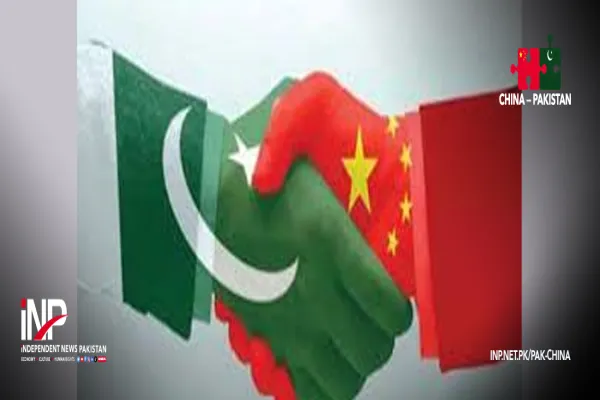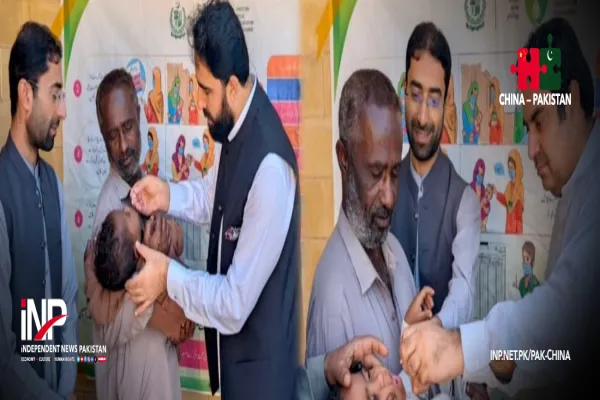i NEWS PAK-CHINA
The 8th CPEC Media Forum has called for objective narrative of CPEC amid fruitful outcomes, China Economic Net (CEN) reported on Friday. The Forum was held here and Gwadar both online and offline. It saw the unfolding of several key events, including the CPEC Golden Anchor Awarding Ceremony, the launch of the CPEC Media Forum Balochistan Initiative, and the Perceptions on CPEC in Pakistan research paper, and the unveiling of the Joint Statement of 8th China Pakistan Economic Corridor (CPEC) Media Forum. The forum commenced with Cui Jun, President of China Economic Net, reading out a congratulatory letter from Sun Weidong, Vice Minister of Foreign Affairs of China, to the CPEC Media Forum.
The letter stated, “Under the strategic guidance of the leaders of the two countries and the care and support of people from all sectors, China-Pakistan relations have grown in depth in recent years and bilateral cooperation in various fields has yielded fruitful results.” The letter added that to further strengthen friendship and collaboration between China and Pakistan, media professionals of both countries are expected to undertake significant responsibilities and tasks. The positive role of CPEC in Pakistan was echoed by Murtaza Solangi, Caretaker Federal Minister for Information & Broadcasting, who stated that the economic corridor “has transformed Pakistan's socioeconomic landscape, addressing a dire energy crisis and crumbling infrastructure,” and “has generated 236,000 jobs since 2013, and is set to create 1.2 million direct jobs, contributing to local workforce development and reducing regional disparities.”
In response to the use of “selective facts, emotions, and sometimes misleading stories” by the Western media against CPEC, Murtaza called for media personnel of both countries to engage in the objective reporting of CPEC and disseminate accurate and unbiased narratives responsibly. Zheng Qingdong, President and Editor-in-Chief of Economic Daily, highlighted the constructive role of Chinese and Pakistani media in creating an enabling public atmosphere for CPEC.
He suggested that both sides are expected to jointly navigate through challenges for more development opportunities, enhance exchanges for people-to-people bonds and connectivity, and conduct impartial, evidence-based news reporting. Senator Mushahid Hussain Sayed, Chairman, Senate Defense Committee and Pakistan-China Institute, noted that CPEC, featuring openness, inclusivity, and connectivity, has advanced notably and “the best of CPEC is yet to come.” He added that challenges such as the issue of fake news from the West around China-Pakistan cooperation should be tackled.
Wu Xu, Executive Secretary of China Journalists Association, advocated for objective reporting to counter misinformation against CPEC, and stressed the importance of social media for positive narrative of bilateral cooperation. She also called for enhanced Chinese-Pakistani media cooperation through news cooperation and training sessions. Chinese Ambassador to Pakistan Jiang Zaidong highlighted the major cooperation features between China and Pakistan this year. This encompasses high-level government exchange and cooperation, deepening CPEC cooperation, as well as fruitful outcomes in livelihood projects. Jiang further noted that to counter fake news against China-Pakistan cooperation, media in both countries weree encouraged to enhance cooperation, diversify content, innovate communication methods, extend media platforms, and widen audience reach.
Pakistani Ambassador to China Khalil Hashmi underscored that as CPEC enters its second phase, bilateral cooperation is expected to further boost bilateral socio-economic development, industrial cooperation media collaboration, enhance the seamless connectivity between Xinjiang and Gilgit Baltistan, and join hands to combat climate change. Following the welcoming remarks and speeches, three panel discussions were held. The topics ranged from exploring green development opportunities under the Belt and Road Initiative (BRI), and concerted efforts to counter propaganda and disinformation against CPEC, to reviewing achievements and future plans for CPEC.
On the occasion, eight Pakistani media persons were awarded the “CPEC Golden Anchor” for their contributions to strengthening CPEC and China-Pakistan friendship. The forum released The Perceptions on CPEC in Pakistan, a research paper which, through a questionnaire interview of 350 Pakistani people across different age groups and various sectors of stakeholders, accessed how Pakistani people view CPEC and explored the reasons for their responses. The forum also launched the CPEC Media Forum Balochistan Initiative, which includes workshops for lawmakers in Balochistan, collaboration for chambers of Balochistan, and internship opportunities for Baloch youth.
The Joint Statement of 8th China Pakistan Economic Corridor (CPEC) Media Forum was also inaugurated, in which 11 points were made to celebrate a decade of China-Pakistan cooperation in infrastructure and energy, emphasising sustainable development, countering misinformation, and fostering inclusivity, with a focus on technological innovation, cultural exchanges, and regional diplomatic dialogue for future success. Themed “Next decade of CPEC: Opportunities & learning from past decade”, the CPEC Media Forum was jointly organised by China Economic Net (CEN) and Pakistan-China Institute (PCI) in collaboration with the Chinese Embassy in Pakistan. After eight years of development, CPEC Media Forum has now grown into an indispensable exchange platform for the Chinese and Pakistani media with the biggest influence and most remarkable achievements.
The Chinese side was represented by Sun Weidong, Vice Minister of Foreign Affairs of China, Jiang Zaidong, Ambassador of China to Pakistan, Zheng Qingdong, President and Editor-in-Chief of Economic Daily, Wu Xu, Executive Secretary of China Journalists Association, Cui Jun, President of China Economic Net, Li Yue, Vice President and Board Member of China Economic Information Service of Xinhua News Agency, Mu Zongcong, Chief Editor of International Department of People's Daily, Du Jianing, Director of China Media Group Islamabad Studio, Yu Xiaokui, Deputy Director of International Department of Guangming Daily.
The Pakistani side was represented by Murtaza Solangi, Caretaker Federal Minister for Information & Broadcasting, Senator Mushahid Hussain Sayed, Chairman, Senate Defense Committee and Pakistan-China Institute, Hassan Daud Butt, former CEO of Khyber Pakhtunkhwa Board of Investment & Trade (KP-BOIT), Naghmana Hashmi, former Pakistani Ambassador to China, Mustafa Hyder Sayed, Executive Director of Pakistan China Institute, Khalid Waleed, Research Fellow of SDPI, Muhammad Umar Farooq, Research Associate of Pakistan-China Institute, Hamid Mir, Senior Journalist and Anchor at Geo TV, Shiffa Yousafzai, Journalist and Anchor at 92 News HD, Bahram Baloch, Correspondent of Dawn, Prof Dr Manzoor Ahmed, Vice President of Gwadar University, and Saboor from the University.
Credit: Independent News Pakistan (INP) — Pak-China









